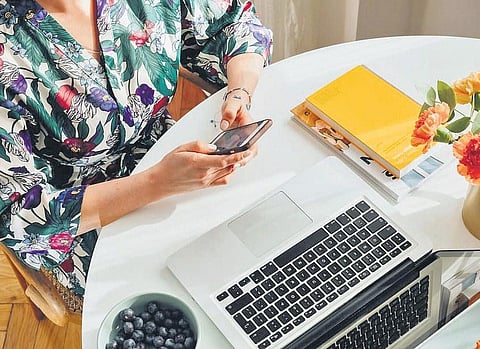

I’ve been working from home since late 2016, and I hope I can offer some suggestions on effectively doing so if you’re new to it. To begin, some practical tips: never work in bed. It’s terrible for your back. If you don’t have a desk, use a dining table or kitchen counter. If you have enough space so that you can set up an “office”, do so, and don’t eat or watch TV there. Demarcating spaces will also help you demarcate time. You may feel you have a lot less or a lot more time than you did before. Keep daily checklists (personal and professional) as well as weekly and monthly planners.
It helps to keep your eye on the big picture when the days merge formlessly. If there’s less work, set manageable growth-oriented tasks: updating your CV, making a vision board, etc. Leisure soothes; don’t beat yourself up. Working from home is an enormous privilege, as evidenced by the thousands of migrant labourers who walked the Indian highways to reach their villages when this lockdown was announced. People who are or provide the supply chain, sanitation services, home deliveries and medical attention can’t work from home either. This reality doesn’t nullify the fact that “home”, even if there’s a roof above one’s head and Wi-Fi, can be a highly toxic environment.
This is truer than not in the Indian context, bound by patriarchy, where every family has a mountain of “dust” swept under a flimsy carpet. Set private boundaries even if others don’t respect them. For instance, commit to not engaging with anyone whose behaviour sets you off. Bite your tongue, keep up self-healing practices if you have the privacy to, and train your eyes on the longterm. If you realise that you don’twant to live like this permanently, accept that it will be months at least before changing your life becomes viable. Focus on surviving this, then getting out. No matter your scenario, mental health is a priority at this time. In a state of uncertainty, we are softer targets than ever.
With the anxiety-inducing effects of constantly checking the news, paired with the tentacles of inadequacy that brands/influencers still shoot into our lives, it’s best to be careful about social media usage. Take up journalling: empty your worries into it. There are many guided or prompt-based practices online. Be flexible about how you define productivity. It’s hard to concentrate right now, so if you don’t learn a new language or tackle that to-be-read pile, it’s okay! When you feel overwhelmed, return to this question: Who do you want to be when all of this is over? The skills you acquire in this time are not only meant for crises.
They are all adaptable into the next normal, post-pandemic. Try to see this period as a beautiful opportunity to inculcate practices for the long-term. These include taking up meditation or exercise, budgeting better, building meaningful connections based on communication (not activity), fairer division or more efficient management of household chores, eating more creatively, developing clearer socio-political ideas, achieving a healthy work-life balance, becoming self-disciplined and much more. Lean into growth, not fear.